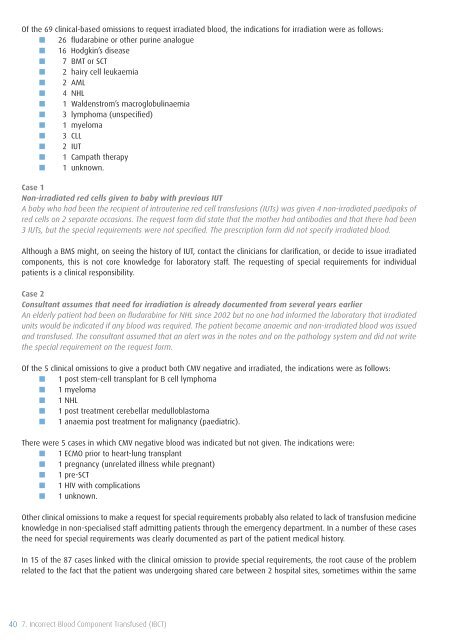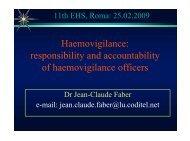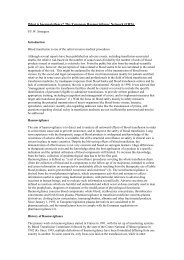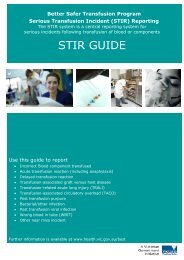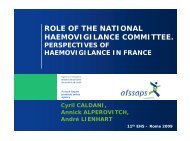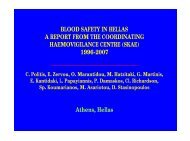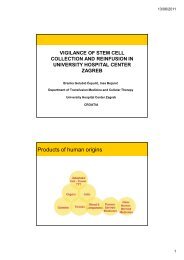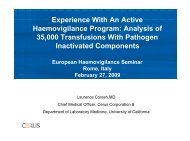SHOT Annual Report 2009 - Serious Hazards of Transfusion
SHOT Annual Report 2009 - Serious Hazards of Transfusion
SHOT Annual Report 2009 - Serious Hazards of Transfusion
You also want an ePaper? Increase the reach of your titles
YUMPU automatically turns print PDFs into web optimized ePapers that Google loves.
Of the 69 clinical-based omissions to request irradiated blood, the indications for irradiation were as follows:<br />
■■ 26 fludarabine or other purine analogue<br />
■■ 16 Hodgkin’s disease<br />
■■ 7 BMT or SCT<br />
■■ 2 hairy cell leukaemia<br />
■■ 2 AML<br />
■■ 4 NHL<br />
■■ 1 Waldenstrom’s macroglobulinaemia<br />
■■ 3 lymphoma (unspecified)<br />
■■ 1 myeloma<br />
■■ 3 CLL<br />
■■ 2 IUT<br />
■■ 1 Campath therapy<br />
■■ 1 unknown.<br />
Case 1<br />
Non-irradiated red cells given to baby with previous IUT<br />
A baby who had been the recipient <strong>of</strong> intrauterine red cell transfusions (IUTs) was given 4 non-irradiated paedipaks <strong>of</strong><br />
red cells on 2 separate occasions. The request form did state that the mother had antibodies and that there had been<br />
3 IUTs, but the special requirements were not specified. The prescription form did not specify irradiated blood.<br />
Although a BMS might, on seeing the history <strong>of</strong> IUT, contact the clinicians for clarification, or decide to issue irradiated<br />
components, this is not core knowledge for laboratory staff. The requesting <strong>of</strong> special requirements for individual<br />
patients is a clinical responsibility.<br />
Case 2<br />
Consultant assumes that need for irradiation is already documented from several years earlier<br />
An elderly patient had been on fludarabine for NHL since 2002 but no one had informed the laboratory that irradiated<br />
units would be indicated if any blood was required. The patient became anaemic and non-irradiated blood was issued<br />
and transfused. The consultant assumed that an alert was in the notes and on the pathology system and did not write<br />
the special requirement on the request form.<br />
Of the 5 clinical omissions to give a product both CMV negative and irradiated, the indications were as follows:<br />
■■ 1 post stem-cell transplant for B cell lymphoma<br />
■■ 1 myeloma<br />
■■ 1 NHL<br />
■■ 1 post treatment cerebellar medulloblastoma<br />
■■ 1 anaemia post treatment for malignancy (paediatric).<br />
There were 5 cases in which CMV negative blood was indicated but not given. The indications were:<br />
■■ 1 ECMO prior to heart-lung transplant<br />
■■ 1 pregnancy (unrelated illness while pregnant)<br />
■■ 1 pre-SCT<br />
■■ 1 HIV with complications<br />
■■ 1 unknown.<br />
Other clinical omissions to make a request for special requirements probably also related to lack <strong>of</strong> transfusion medicine<br />
knowledge in non-specialised staff admitting patients through the emergency department. In a number <strong>of</strong> these cases<br />
the need for special requirements was clearly documented as part <strong>of</strong> the patient medical history.<br />
In 15 <strong>of</strong> the 87 cases linked with the clinical omission to provide special requirements, the root cause <strong>of</strong> the problem<br />
related to the fact that the patient was undergoing shared care between 2 hospital sites, sometimes within the same<br />
40 7. Incorrect Blood Component Transfused (IBCT)


